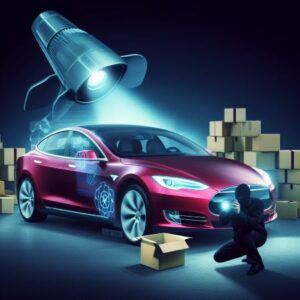In the age of smart cars, the convergence of technology and automobiles has reached an unprecedented level. Tesla, a pioneer in the electric vehicle market, has consistently pushed the boundaries of innovation in the automotive industry. However, as Tesla’s vehicles become increasingly connected and equipped with embedded audio-video technology, there is a growing concern regarding the potential for these cars to be used as tools for espionage.
1. The Smart Car Revolution: A Double-Edged Sword
Tesla has been a frontrunner in turning cars into smart, connected devices. Their vehicles are essentially computers on wheels, with advanced infotainment systems and autopilot features that require real-time data transmission and analysis. While this connectivity enhances the driving experience, it also opens the door to potential vulnerabilities.
2. Embedded Audio-Video Technology: A New Dimension
New Tesla models are equipped with sophisticated embedded audio and video technology, such as cabin cameras and microphones. These features serve various purposes, including driver monitoring, enhancing autonomous driving capabilities, and enabling in-car entertainment. However, these very features, if compromised, could pose significant privacy and security risks.
3. The Specter of Remote Access
One of the key concerns surrounding embedded audio-video technology is the potential for remote access via the internet. If a malicious actor gains access to a Tesla vehicle’s systems, they could exploit the cameras and microphones to monitor the car’s surroundings and occupants without their knowledge or consent. This not only raises privacy issues but also creates the risk of espionage.
4. Multiple Objectives for Espionage
The ability to remotely access a Tesla’s audio and video systems opens the door to a range of espionage objectives:
- Corporate Espionage: Competitors or state-sponsored actors could use compromised Teslas to eavesdrop on confidential business conversations or intellectual property discussions.
- Government Surveillance: Espionage agencies could exploit connected Teslas for surveillance of targeted individuals, organizations, or even government officials.
- Personal Data Theft: Malicious actors might seek to obtain personal data from individuals, potentially including sensitive information like financial data, personal conversations, or private locations.
- Geolocation Tracking: Spies or cybercriminals could use the embedded technology to track the movements of Tesla owners, which can have serious privacy and security implications.
5. Protecting Against Potential Exploitation
To mitigate the risk of Tesla vehicles becoming tools for espionage, several steps must be taken:
- Security Updates: Tesla and other automakers need to continuously update their software to patch vulnerabilities and enhance cybersecurity.
- User Awareness: Tesla owners should be educated on the potential risks and how to protect their vehicles from unauthorized access.
- Regulation: Governments and industry watchdogs must establish clear regulations and standards for cybersecurity in smart vehicles.
- Third-Party Audits: Independent cybersecurity experts should conduct audits of smart car systems to identify and address vulnerabilities.
- Legislation and Enforcement: Stricter laws and enforcement against stalking and paparazzi activities are essential to protect the privacy and safety of individuals, including celebrities.
6. Balancing Innovation and Security
As the automotive industry continues to evolve and embrace smart technology, the delicate balance between innovation and security becomes increasingly critical. Tesla’s vehicles offer numerous benefits, but the potential for espionage highlights the importance of robust cybersecurity measures and user vigilance.
In a world where technology and connectivity are integral to our daily lives, haptic solutions offer a tangible and user-friendly approach to addressing privacy and security concerns within smart cars. By incorporating haptic technology, smart vehicle manufacturers can empower users to maintain control over their personal space and data, mitigating the risks of espionage and paparazzi activities.
In a world where even our cars are connected to the internet, the implications of a compromised vehicle go beyond the inconvenience of a simple data breach. They touch on the very fabric of our privacy, security, and personal safety. The road ahead requires a vigilant approach to ensure that our journeys remain as secure as they are innovative.